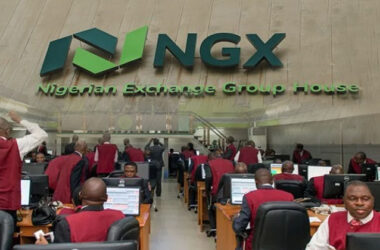Fitch Ratings has revised the Outlooks on FBN Holdings Plc’s (FBNH) and its main operating subsidiary First Bank of Nigeria Ltd.’s (FBN) Long-Term Issuer Default Ratings (IDRs) to Positive from Stable and affirmed the IDRs at ‘B-‘.
The revision of the Outlooks mirrors the recent sovereign outlook revision and reflects Fitch’s view that Nigeria’s Long-Term IDRs are likely to represent less of a constraint on the issuers’ standalone creditworthiness in the near term.
Fitch has also affirmed the issuers’ National Long-Term Ratings at ‘A(nga)’ with stable outlooks.
According to the rating note, FBN and FBNH’s IDRs are driven by their standalone creditworthiness, as expressed by their viability ratings.
Fitch said the VRs reflect the banks’ high sovereign exposure relative to capital and the concentration of their operations in Nigeria.
However, the positive outlooks on the Long-Term IDRs mirror that on the sovereign. It said the National ratings balance a strong franchise, healthy profitability and a stable funding profile against high credit concentrations and thin capital buffers.
FBN, Nigeria’s third-largest bank, representing 10.7% of banking system assets at the end of 2023. Its strong franchise supports a stable funding profile and low funding costs. Revenue diversification is significant, with non-interest income typically exceeding 40% of operating income.
The lender’s single-borrower credit concentration is material, with the 20 largest loans representing 354% of FBN’s total equity at end-1Q24.
Oil and gas exposure (which accounted for 33% of gross loans in 2023) is greater than the banking-system average.
Sovereign exposure through securities and cash reserves at the Central Bank of Nigeria (CBN) is also considered to high relative to FBNH’s Fitch Core Capital of 334% in 2023.
FBNH’s impaired loans or stage 3 loans under IFRS 9 ratio increased slightly to 4.9% in 2023 from 4.7% in the financial year 2022 due to operating environment challenges.
Fitch said the group’s specific loan loss allowance coverage of impaired loans was 40% at the end of 2023. Its stage 2 loans remain high, accounting for 20% of gross loans; concentrated in the oil and gas sector and largely US dollar-denominated and represent a key risk to asset quality, having inflated due to the devaluation.
Fitch forecasts the impaired loans ratio will increase moderately in the near term.
FBNH has healthy profitability, according to the rating note as indicated by operating returns on risk-weighted assets (RWAs) averaging 3.5% over the past four years.
Earnings benefit from a low cost of funding and strong non-interest income. Fitch said. Profitability improved notably in 2023 and 1Q24, primarily driven by FX revaluation gains accompanying the naira devaluation due to a net long foreign-currency position.
FBN’s bank-solo capital adequacy ratio of 5.5% in Q1-2024 has a thin buffer over the bank’s minimum regulatory requirement of 15%.
The rating note explained that impaired loans net of specific loan loss allowances were 12% of FCC in 2023. Fitch expects capitalisation to improve moderately in the near term as a result of strong profitability and capital raisings to comply with FBN’s impending new paid-in capital requirement of N500 billion.
FBNH’s customer deposit base – which accounted for 73% of total non-equity funding- comprises a high share of retail deposits and current and savings accounts of 78% in Q1, supporting funding stability and low funding costs. Depositor concentration is fairly low. #Fitch Revises Outlooks on FBN Holdings, First Bank of Nigeria








